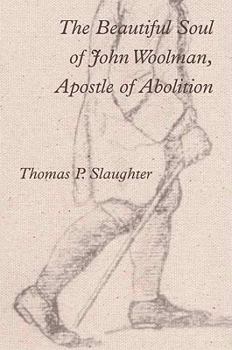The Beautiful Soul of John Woolman, Apostle of Abolition
Select Format
Select Condition 
Book Overview
A biography of the famous eighteenth-century Quaker whose abolitionist fervor and spiritual practice made him a model for generations of Americans John Woolman (172072) was perhaps the most significant American of his age, though he was not a famous politician, general, or man of letters, and never held public office. A humble Quaker tailor in New Jersey, he became a prophetic voice for the entire Anglo-American world when he denounced the evils of...
Format:Hardcover
Language:English
ISBN:0809095149
ISBN13:9780809095148
Release Date:September 2008
Publisher:Hill & Wang
Length:464 Pages
Weight:1.66 lbs.
Dimensions:1.5" x 6.6" x 9.3"
Customer Reviews
1 rating
A Unique Biography
Published by Thriftbooks.com User , 15 years ago
Friends' journals are a unique literary/religious genre. They are spiritual autobiographies and, I was once told, serve as an alternative for Quakers to a written dogma. You can buy many of them very cheaply on the used and rare book sites both because a lot of them were published and because they are generally stultifying, even if you are acquainted with the formulaic religious language in which they are written. There are some exceptions to the stultifying rule: George Fox's journal, sometimes; the neglected journal of Thomas Chalkey (though it's deservedly mentioned in the Oxford Comp. to Am. Lit.); and , of course, John Woolman's journal. If you are approaching your dotage, you may have read selections from Woolman's journal in the course of your secular education. Being a Quaker, I read it a bit more closely. Impressionistically, I remember the episode about not dying his clothes and especially the picture of him on his porch one morning surveying his bustling store with wagons coming in and out and wondering, What have I done wrong? How un-American is that? Of course, Woolman is also a great figure in the Abolitionist movement. From the first, in the 1600's, the thought that all partake in the divinity led many Quakers to a radical egalitarianism. Passing through the Barbados in the 17th cent., Wm. Penn was led to write that reversing the environments of his children with that of the plantation slaves' environment would result in black nobles and white slaves. This view that others are our equals in the extended human - not just "spiritual" - sense really wasn't accepted until the late 20th cent. by most Euro-Americans, though in 2009 it seems to be getting some traction. This tenderness resulted in Quakers (though not numerous) being seminal figures not just in the abolitionist movement , but in women's suffrage, prison reform and caring fro the mentally ill both in Great Britain and the Consulting the journals of these figures is not a good way for the uninitiated to get a picture of their lives and times. If you (or, say, I) were writing about giving up drinking, nights on the town might be mentioned, fights in the kitchen, the reactions of the children and so on. Good reading, that. In a Quaker journal, however, the subject would be dealt with by saying something like "after long and increasing travail, I was favored by Him Who is the Source of all Truth with a purity of understanding of the dangers of toasts and outward conviviality and the use of spirituous drink, and was opened to put it from me by his Gracious Love and Dispensation." Dwelling on individuals, places, scenes and the like is not the point of these works. They are rather an account of the author's inner life and as Slaughter points out, if some irrelevant detail does slip in, a review committee would likely strike it out (there are exceptions). Though we can cipher quite a lot about Woolman's spiritual struggles from his writings, about the visible






